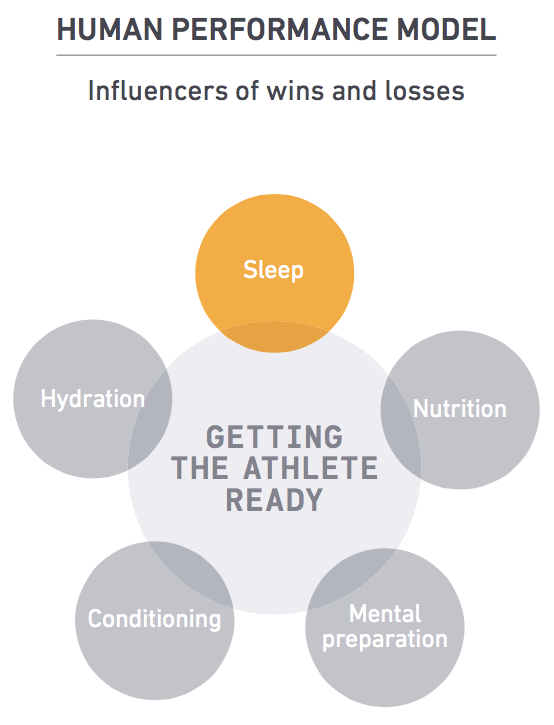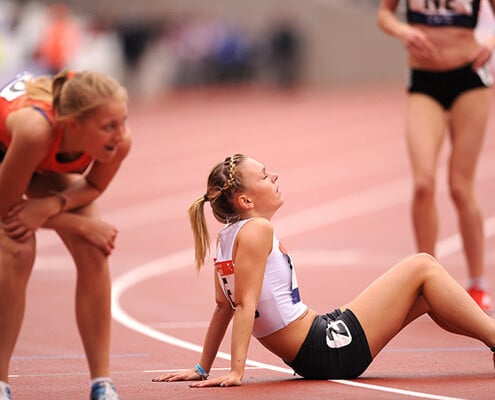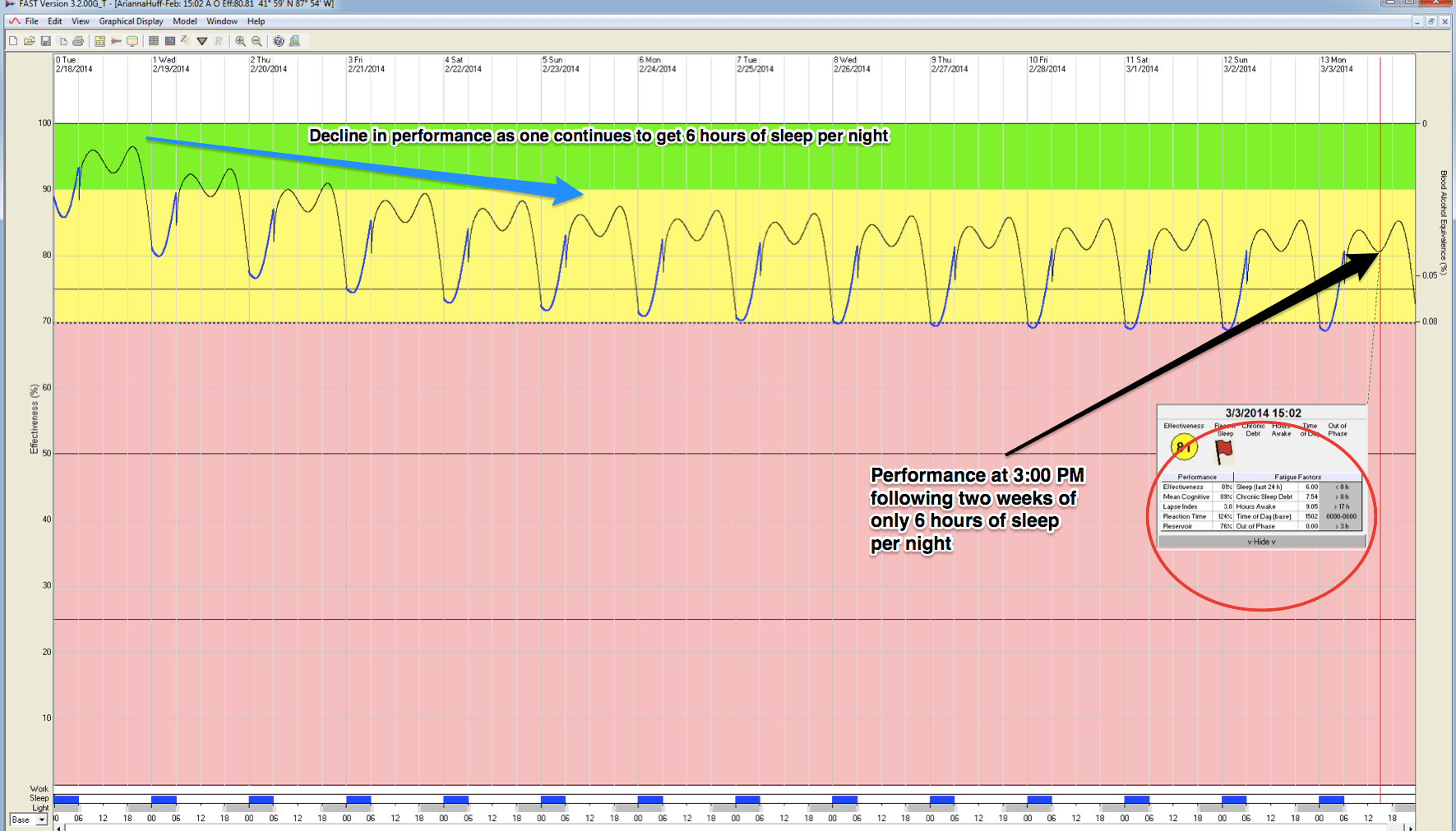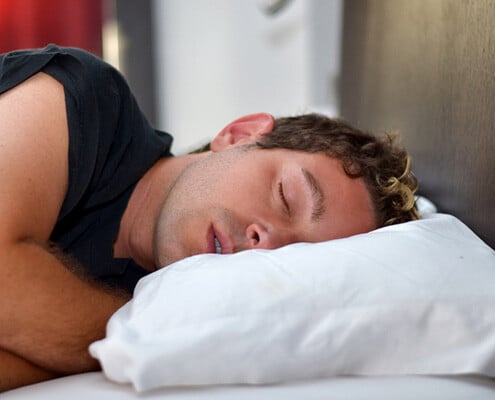UPDATED MAY 7, 2019
Introduction
For all of us, sleep is an important part of maintaining optimum health. For elite athletes however, sleep becomes a crucial pillar of success. When it comes to athletic performance, sleep plays a part in:
• Reaction times
• Motor function
• Motivation
• Focus
• Stress regulation
• Muscle recovery
• Sprint performance
• Muscle glycogen
• Glucose metabolism
• Memory and learning
• Injury risk
• Illness rates
• Unwanted weight gain
The list could go on. More and more athletes are learning that sleep has a big impact on performance, wins, and losses. Physical conditioning and good nutrition are critical in reaching peak athletic performance, but sleep plays an equally important role. In recent years, it’s become clear that both the quality and quantity of sleep obtained by elite athletes can be the edge between winning and losing on game-day. Read on to discover the ways that sleep is impacting your athletic performance.

Injury Rates
Reduced sleep has been linked to increased injury rates during athletic competitions. A University of California study concluded that injury rates in youth athletes increased during games that followed a night of sleep fewer than 6 hours. Another study looking at injury rates in high school athletes found that sleep hours were the strongest predictor of injuries, even more so than hours of practice.
“Keep your head up!” is a common refrain of coaches in youth sports for good reason. Especially in high-impact and fast-paced sports, it’s important for players to read their surroundings and anticipate potential collisions. When a player is fatigued after poor sleep, they’re slower to react. A slowed reaction time could be the difference between a player taking a preventable injury or bracing for an impact.
Fatigue also affects the body’s immune system, making players more susceptible to illness. In close team environments, illnesses are given the opportunity to spread, and it’s important for teams to eliminate risk factors like poor sleep to ensure that everyone remains healthy.
A recent study involving sleep data in mixed martial arts also demonstrated a link between sleep and injuries. The study concluded that among a group of athletes undergoing performance testing in a six-week fight camp, “athletes who showed consistency in sleep…missed significantly fewer sessions due to fatigue and injury throughout.” The study also concluded that, “other tactical occupations such as military, law enforcement, and fire departments may benefit from consistency in sleep metrics.”
When it comes to sleep recovery, short sleep periods also don’t provide the body with the time to regenerate cells and repair from the abuse of workouts, games, and daily activities. This means that not only can sleep deprivation take players out of the game through injuries, but it can also keep them out longer due to slowed recovery. Over time, sports injuries, health issues, and the inability to fully recover can wear on an athlete and contribute to more time spent on the sidelines.
What to Do
In an interview with Parade magazine, Tom Brady highlighted the need for a regular sleep schedule to the recovery of his body. While it’s not always possible to avoid injuries, athletes that maintain a steady sleep schedule give their bodies the best possible chance to recover quickly and avoid future preventable injuries.
“If you told an athlete you had a treatment that would reduce the chemicals associated with stress, that would naturally increase human growth hormone, that enhances recovery rate, that improves performance, they would all do it. Sleep does all of those things.”
— Casey Smith, Head Athletic Trainer, Dallas Mavericks
Accuracy and Speed
Sleep quality has been shown to impact both the shooting accuracy and sprint times of basketball players. Improved sleep has also seen increases to athletic performance in tennis players, swimmers, weightlifters, and more.
Cheri Mah, a researcher at Stanford university, conducted a sleep-extension study with the Stanford men’s basketball team. After maintaining a normal sleep schedule for 4 weeks to establish a baseline, players from the team went through a 7-week sleep extension period. Over this time, the players obtained as much nighttime sleep as possible, with 10 hours being the goal. The results:
“Measures of athletic performance specific to basketball were recorded after every practice including a timed sprint and shooting accuracy. Subjects demonstrated a faster timed sprint following sleep extension. Shooting accuracy improved, with free throw percentage increasing by 9% and 3-point field goal percentage increasing by 9.2%. Improvements in specific measures of basketball performance after sleep extension indicate that optimal sleep is likely beneficial in reaching peak athletic performance.”
An earlier study of weightlifters carried out at the Centre for Sport and Exercise Sciences at John Moores University in Liverpool found similar conclusions, as it measured partial sleep deprivation against normal sleep. The sleep deprivation was shown to have a significant negative impact on bench press, leg press, and dead lift exercises, and daily mood checks showed a significant increase to confusion and fatigue.
Both these studies show that sleep is crucial to the physiological, biochemical, and cognitive restoration of the body. Not only has a lack of sleep been shown to reduce athletic performance, but increased sleep has also been shown to have a significant impact on improving performance.
What to Do
Our Science of Sleep eBook breaks down a comparison of two soccer goalkeepers with some very different sleep habits. Knowing how rested an athlete is before a game could help their coach make decisions as game time nears. The decision may be that an athlete needs more rest than practice in order to deliver peak performance when the time comes.
Reaction Times
Studies have shown that even a low level of fatigue can impair reaction times as much or more than being legally drunk. Sleep deprivation has an impact comparable to intoxication by alcohol, which for athletes can have a major impact on their game.
An elite athlete can’t spare even fractions of a second to react to a play unfolding in front of them. While it’s common sense for that athlete to remain sober on the field, a poorly rested athlete, clean from alcohol, could still be similarly impaired. A single all-nighter can reduce reaction times by more than 300%, and the sleep recovery can take several days.
According to Harvard Medical School’s Division of Sleep Medicine, “being awake for 22 hours straight can slow your reaction time more than four drinks can.” While there are physiological differences between being intoxicated and being fatigued, the impact on reaction times is still present. If an athlete wouldn’t reasonably expect to have peak reaction times after drinking four beers, they can’t expect to perform their best on less than a full night’s sleep.
What to Do
People often overestimate the amount of sleep that they get, and athletes are no different. One of the best ways to ensure that you’re getting enough sleep is to plan ahead and strategize. Setting routines, avoiding caffeine and alcohol before sleep, and establishing boundaries for the use of electronic devices in the bedroom all contribute to better sleep.
“We’re teaching our players: Sleep is a weapon.”
— Sam Ramsden, Dir. of Player Health and Performance, Seattle Seahawks
Decision Making
A study of Major League Baseball players found that they consistently showed better judgement at the beginning of the season than at the end. The suspected cause? Mental fatigue during an arduous 162 game season.
The study covered 30 baseball teams and showed that players demonstrated a decrease in “plate discipline” as the season progressed, leading to an increase in batters swinging at balls outside of the strike-zone. This seems to buck traditional logic that predicts teams to have increased discipline over the season as players receive more practice and at-bats. When describing the impacts of the study, the principal investigator, Scott Kutscher, stated that, “a team that recognizes this trend and takes steps to slow or reverse it – by enacting fatigue-mitigating strategies, especially in the middle and late season, for example – can gain a large competitive advantage over their opponent.”
Other impacts of reduced sleep show that motivation, focus, memory, and learning are all impaired by shortened sleep. Without sleep, the brain struggles to consolidate memories and absorb new knowledge. A spotlight on the science of sleep in Maclean’s magazine pointed to multiple studies which showed that sleep loss impairs the brain’s frontal lobe and decision-making abilities.
The impairment to the brain’s decision-making centres following sleep loss was found to increase risk-taking behaviour, and adjustments to moral reasoning and inhibitions. Jennifer Peszka, a co-author of one of the studies cited by Maclean’s pointed out the similarities between reduced sleep and intoxication by alcohol to the brain’s decision-making processes.
What to Do
Being rested before an athletic event can often mean planning in advance. We’ve written in the past about some sleep strategies for athletes on their days off. Some of our tips include maintaining the circadian rhythm and managing social jet lag.
Playing Careers
A study of Major League Baseball players showed that fatigue can shorten the playing careers (and therefore income) of professional athletes. The study followed 80 baseball players across three teams and after three seasons recorded players who either were demoted to a lower league, went unsigned, or who were no longer playing, as inactive.
The principal investigator of the study, W. Christopher Winter, MD, medical director of the Martha Jefferson Hospital Sleep Medicine Center in Charlottesville, stated that those conducting the study were “shocked by how linear the relationship was.” Winter pointed out that, “from a sports perspective, this is incredibly important. What this study shows is that we can use the science of sleep to predict sports performance.”
Winter placed such importance behind the findings of his study that he went on to describe several ways that sports teams could benefit. When evaluating players, Winter stated that teams, “easily could implement sleepiness screening.” Winters also noted that both players and their teams would benefit from being able to diagnose and treat conditions that lead to fatigue during the day.
A recent meta-analysis of on the sleep habits of athletes found that athletes were often unable to achieve recommended sleep times due to early training times, travel, and late-night departure times. Because this is such a wide-spread problem for athletes, it also creates opportunity for competitive edge among those athletes who are able to adopt better sleep patterns long-term.
Mental fatigue that results from a lack of sleep is not the same as the fatigue that results from physical exertion, and it needs to be treated differently. Being physically rested might help an athlete make the play, but being mentally rested will help that player make the right play.
What to Do
Since sleep habits are such an important aspect of predicting long-term athletic performance, athletes may want to investigate known methods for achieving the most restful sleep possible. Elite athletes experiencing sleep difficulties may want to look into some of the sleep aids that we’ve written about in the past.
“Fatigue makes cowards of us all.”
— Vince Lombardi
Final Thoughts
The importance of sleep to athletic performance can’t be overstated. Sleep quality can predict how fast an athlete will react, how quickly they’ll act, how accurate they’ll be, how many errors they’ll make, and if they do make an error, whether they’ll avoid an injury. Along with physical and mental conditioning, proper nutrition and hydration, sleep should be a regular part of any elite athlete’s preparation.
Now that you know 5 ways that sleep impacts athletic performance, get even more tips on managing fatigue and athletic effectiveness by downloading our comprehensive eBook on the Science of Sleep. In our eBook, you’ll learn:
• The difference between mental and physical fatigue.
• How sleep deprivation affects an athlete’s mental and physical performance.
• How sleep quantity and quality can be measured.
• How Fatigue Science’s technology helps elite sports teams manage sleep and improve performance.
Interested in learning more about data-driven fatigue management?
or for a comprehensive overview of the scientific link between sleep and athletic performance, download our free Science of Sleep eBook
Further Reading
•The effects of sleep extension on the athletic performance of collegiate basketball players
Mah C, et al. (2011)
•Effects of training and competition on the sleep of elite athletes: a systematic review and meta-analysis
Roberts, Spencer Stuart Haines, et al. (2018)
•Ongoing study continues to show that extra sleep improves athletic performance
Mah C, et al. (2008)
•The effect of partial sleep deprivation on weight-lifting performance
Reilly T, Piercy M. (1994)
• Sports-related injuries in youth athletes: is overscheduling a risk factor?
Luke A, et al. (2011)
•Sleep Data, Physical Performance, and Injuries in Preparation for Professional Mixed Martial Arts
Peacock, Corey A., et al. (2019)
• Chronic lack of sleep is associated with increased sports injuries in adolescent athletes
Milewski MD, et al. (2014)
•How sleep deprivation decays the mind and body
The Atlantic
•Moderate sleep deprivation produces impairments in cognitive and motor performance equivalent to legally prescribed levels of alcohol intoxication
Williamson A, Feyer A. (2000)
• Sleep prior to and following competition in professional rugby league athletes]
Driller, Matthew (2018)
•How awake are you?
Hardvard Medical
•The sleep crisis and the science of slumber
Maclean’s
•Studies link fatigue and sleep to Major League Baseball (MLB) performance and career longevity
Winter C. M



